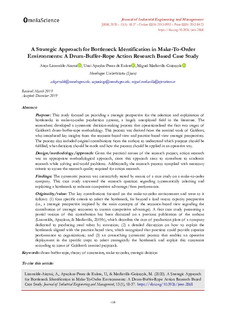| dc.rights.license | Attribution-NonCommercial 4.0 International | * |
| dc.contributor.author | Lizarralde, Aitor | |
| dc.contributor.author | Apaolaza, Unai | |
| dc.contributor.author | Mediavilla Guisasola, Miguel | |
| dc.date.accessioned | 2020-10-21T07:23:42Z | |
| dc.date.available | 2020-10-21T07:23:42Z | |
| dc.date.issued | 2020 | |
| dc.identifier.issn | 2013-8423 | en |
| dc.identifier.other | https://katalogoa.mondragon.edu/janium-bin/janium_login_opac.pl?find&ficha_no=160407 | en |
| dc.identifier.uri | https://hdl.handle.net/20.500.11984/1860 | |
| dc.description.abstract | Purpose: This study focused on providing a strategic perspective for the selection and exploitation of bottlenecks in make-to-order production systems, a largely unexplored field in the literature. The researchers developed a systematic decision-making process that operationalized the first two stages of Goldratt’s drum-buffer-rope methodology. This process was derived from the seminal work of Goldratt, who introduced key insights from the resource-based view and practice-based view strategic perspectives. The process also included original contributions from the authors to understand which purpose should be fulfilled, what decisions should be made and how the process should be applied in an operative way.
Design/methodology/approach: Given the practical nature of the research project, action research was an appropriate methodological approach, since this approach aims to contribute to academic research while solving real-world problems. Additionally, the research process complied with necessary criteria to assure the research quality required for action research.
Findings: The systematic process was successfully tested by means of a case study on a make-to-order company. This case study answered the research question regarding systematically selecting and exploiting a bottleneck to enhance competitive advantage/firm performance.
Originality/value: The key contributions focused on the make-to-order environment and were as it follows: (1) four specific criteria to select the bottleneck, far beyond a load versus capacity perspective (i.e., a strategic perspective inspired by the main concepts of the resource-based view regarding the contribution of strategic resources to sustain competitive advantage). A first case study presenting a partial version of this contribution has been discussed on a previous publication of the authors (Lizarralde, Apaolaza, & Mediavilla, 2019b), which describes the case of production plant of a company dedicated to producing steel tubes by extrusion; (2) a detailed discussion on how to exploit the bottleneck aligned with the practice-based view, which recognised that practices could provide superior performance to organisations; and (3) an overarching systematic process that enables an operative deployment in the specific steps to select strategically the bottleneck and exploit this constraint according to some of Goldratt’s seminal proposals. | en |
| dc.language.iso | eng | en |
| dc.publisher | OmniaScience | en |
| dc.rights | © 2020 by the authors. Licensee OmniaScience | en |
| dc.rights.uri | http://creativecommons.org/licenses/by-nc/4.0/ | * |
| dc.subject | drum-buffer-rope | en |
| dc.subject | theory of constraints | en |
| dc.subject | make-to-order | en |
| dc.subject | strategic decision | en |
| dc.title | A Strategic Approach for Bottleneck Identification in Make-To-Order Environments: A Drum-Buffer-Rope Action Research Based Case Study | en |
| dcterms.accessRights | http://purl.org/coar/access_right/c_abf2 | en |
| dcterms.source | Journal of Industrial Engineering and Management | en |
| local.contributor.group | Dirección de operaciones logístico productivas | es |
| local.description.peerreviewed | true | en |
| local.identifier.doi | https://doi.org/10.3926/jiem.2868 | en |
| local.source.details | Vol. 13. N. 1, 2020 | en |
| oaire.format.mimetype | application/pdf | |
| oaire.file | $DSPACE\assetstore | |
| oaire.resourceType | http://purl.org/coar/resource_type/c_6501 | en |
| oaire.version | http://purl.org/coar/version/c_970fb48d4fbd8a85 | en |








